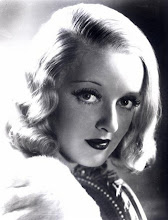It must be true that history repeats itself, or else time-travel exists outside the realm of science fiction. How else could I see a movie from half a century ago and mistake it for a biting social commentary on today's culture?
Picture this: Ditzy blonde is determined to get her name out there, not because she's done anything to make her worth knowing about, but simply because she craves fame for fame's sake. Pretty soon her name and face are everywhere, from TV shows to product endorsements. I could easily be talking about Paris Hilton, but in fact I'm thinking about Gladys Glover, the main character in George Cukor's It Should Happen To You.
Like a lot of today's reality stars, Gladys starts from scratch to promote herself. It isn't quite as easy for her, however. In a time before YouTube and MTV, Gladys has to be a bit more resourceful, spending her life savings to get a billboard in New York City's Columbus Circle painted with her name on it. Her new boyfriend, independent filmmaker Pete Shepherd, looks on with much disdain for the whole project; for the record, I'm on his side, but the film does a good job of presenting both characters' points of view.
The billboard creates buzz around Gladys' name, resulting in appearances on television. "Man and Wife," one of the first shows Gladys scores a spot on, is what initially led me to make the comparison to reality TV, though I think the similarities extend to all of them. The shows Gladys appears on are shown to be obviously staged, but audiences were just as gullible back then as they are now, apparently.
Gladys follows the typical path of more successful flash-in-the-pan celebrities. Fresh from making the rounds on TV, she begins endorsing products left and right. Advertisers spin her as the "average American girl," although she is clearly anything but. She becomes famous for being famous, in a cycle that perpetuates itself until finally she comes to realize the emptiness of it all and concludes that it's better to be known for something on one block than to be known for nothing throughout the world. One can only hope modern society will eventually come to the same realization.
Subscribe to:
Post Comments (Atom)



I kept meaning to feature this movie as one of my Overlooked Oldies but never got around to it! I agree that the famous for being famous angle is very relevant now, but I prefer Gladys Glover's approach of using a billboard as opposed to the reality show route so overdone today. (Even her TV appearances are better than most of the junky shows a person like her would be on today.)
ReplyDeleteYou have a good point, Wendy. Although I think that if as many people put their names on billboards as plaster their faces on the internet/TV, it would probably get just as old just as quickly.
ReplyDeleteI really liked this movie as it was the first time I'd ever seen Judy Holliday, who I think is underrated as an actress. I agree how fascinating the parallels are between Gladys and flash-in-the-pan celebrities are now. However, I confess, I really admire Gladys's character. While she does desire fame for fame's sake, she says she'll do "almost anything" (not anything) to be famous and doesn't want to do anything that isn't dignified or crooked. I really like that about her.
ReplyDeleteGreat post!